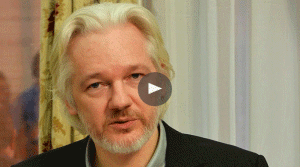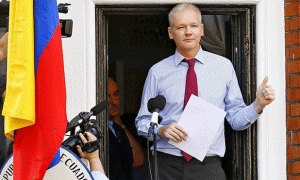by Owen Bowcott and David Crouch
5 February 2016
NOTICE: THIS WORK MAY BE PROTECTED BY COPYRIGHT
YOU ARE REQUIRED TO READ THE COPYRIGHT NOTICE AT THIS LINK BEFORE YOU READ THE FOLLOWING WORK, THAT IS AVAILABLE SOLELY FOR PRIVATE STUDY, SCHOLARSHIP OR RESEARCH PURSUANT TO 17 U.S.C. SECTION 107 AND 108. IN THE EVENT THAT THE LIBRARY DETERMINES THAT UNLAWFUL COPYING OF THIS WORK HAS OCCURRED, THE LIBRARY HAS THE RIGHT TO BLOCK THE I.P. ADDRESS AT WHICH THE UNLAWFUL COPYING APPEARED TO HAVE OCCURRED. THANK YOU FOR RESPECTING THE RIGHTS OF COPYRIGHT OWNERS.

Arbitrary detention ruling is legally binding, says UN official. Photograph: Assange in 2014.
The WikiLeaks founder Julian Assange has been arbitrarily detained by the UK and Sweden for more than five years and should be released immediately with compensation, according to a United Nations report.
As anticipated, the finding by the Geneva-based UN working group on arbitrary detention criticises legal action against Assange by both European governments and blames them for preventing him from leaving the Ecuadorian embassy in Knightsbridge, central London.
The panel calls on the Swedish and British authorities to end Assange’s “deprivation of liberty”, respect his physical integrity and freedom of movement and offer him compensation.
The report says: “The working group considered that Mr Assange has been subjected to different forms of deprivation of liberty: initial detention in Wandsworth prison, which was followed by house arrest and his confinement at the Ecuadorian embassy.
“Having concluded that there was a continuous deprivation of liberty, the working group also found that the detention was arbitrary because he was held in isolation during the first stage of detention and because of the lack of diligence by the Swedish prosecutor in its investigations, which resulted in the lengthy detention of Mr Assange.”
It adds: “The working group therefore requested Sweden and the United Kingdom to assess the situation of Mr Assange to ensure his safety and physical integrity, to facilitate the exercise of his right to freedom of movement in an expedient manner, and to ensure the full enjoyment of his rights guaranteed by the international norms on detention.
“The working group also considered that the detention should be brought to an end and that Mr Assange should be afforded the right to compensation.”
A UK government spokesperson said:“This changes nothing. We completely reject any claim that Julian Assange is a victim of arbitrary detention. The UK has already made clear to the UN that we will formally contest the working group’s opinion.
“Julian Assange has never been arbitrarily detained by the UK. The opinion of the UN working group ignores the facts and the well-recognised protections of the British legal system. He is, in fact, voluntarily avoiding lawful arrest by choosing to remain in the Ecuadorian embassy. An allegation of rape is still outstanding and a European arrest warrant in place, so the UK continues to have a legal obligation to extradite him to Sweden. As the UK is not a party to the Caracas convention, we do not recognise ‘diplomatic asylum’.
“We are deeply frustrated that this unacceptable situation is still being allowed to continue. Ecuador must engage with Sweden in good faith to bring it to an end. America's minister Hugo Swire made this clear to the Ecuadorian ambassador in November, and we continue to raise the matter in Quito.”
The UN committee said one of its members, Leigh Toomey, had declined to take part in the inquiry because she, like Assange, is an Australian citizen. One of the other members, Vladimir Tochilovsky, a Ukrainian lawyer, had disagreed with the finding.
The statement said: “Given that Mr Assange is an Australian citizen, one of the members of the working group who shares his nationality recused herself from participating in the deliberations. Another member of the working group disagreed with the position of the majority and considered that the situation of Mr Assange is not one of detention and therefore falls outside the mandate of the working group.”
Only three of the five-member panel therefore supported the finding against the UK and Sweden.
Anthony Romero, executive director of the American Civil Liberties Union, said: “In light of this decision, it’s clear that any criminal charges against Mr Assange in connection with Wikileaks’ publishing operations would be unprecedented and unconstitutional.
“Indeed, even the prolonged criminal investigation of Wikileaks itself has had a profound chilling effect. The justice department should end that investigation and make clear that no publisher will ever be prosecuted for the act of journalism.”
Much of the criticism in the panel’s full report is directed at the methods adopted by the Swedish prosecutors. The report states: “There has been a substantial failure to exercise due diligence on the part of the concerned states [Sweden and the UK] with regard to the performance of the criminal administration … After more than five years of time lapse, [Assange] is still left even before the stage of preliminary investigation with no predictability as to whether and when a formal process of any judicial dealing would commence.
“Despite that, it is left to the initial choice of the Swedish prosecution as to what mode of investigation would best suit the purpose of criminal justice. The exercise and implementation of the investigation method should be conducted in compliance with the rule of proportionality, including undertaking to explore alternative ways of administering justice.”
The report continues: “The working group is convinced that … the current situation of Mr Assange staying within the confines of the embassy of the Republic of Ecuador in London has become a state of an arbitrary deprivation of liberty.
“The duration of such detention is, ipso facto, incompatible with the presumption of innocence. Mr Assange has been denied the right to contest the continued necessity and proportionality of the arrest warrant in light of the length of this detention. It defeats the purpose and efficiency of justice and the interest of the concerned victims to put this matter of investigation to a state of indefinite procrastination.”
The report implies that insisting on Assange’s extradition to Sweden before any charges have been made amounts to disproportionate pressure in a criminal investigation. Greater efforts should have been made to interview him in the UK.
The panel received representations about the danger of “political persecution” if Assange is removed from Sweden to the US.
The Swedish foreign ministry said: “The [Swedish] government does not agree with the assessment made by the majority of the working group. In light of the safeguards contained in the Swedish extradition and [European arrest warrant] procedures against any potential extradition in violation of international human rights agreements, the government reiterates its position that Mr Assange does not face a risk of refoulement [removal] contrary to international human rights obligations to the United States from Sweden.
“In any case, no request for extradition regarding Mr Assange has been directed to Sweden. Moreover, Mr Assange has chosen, voluntarily, to stay at the Ecuadorian embassy and Swedish authorities have no control over his decision to stay there. Mr Assange is free to leave the embassy at any point. Thus, he is not being deprived of his liberty there due to any decision or action taken by the Swedish authorities.”

